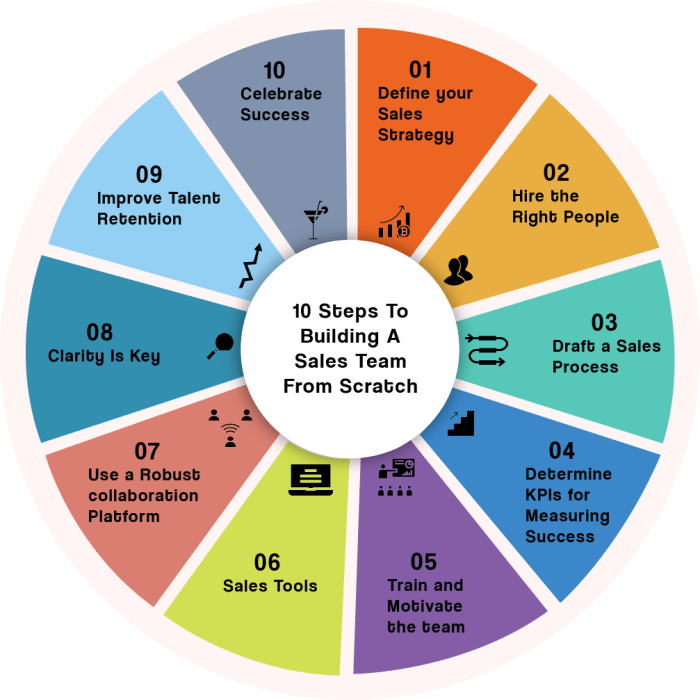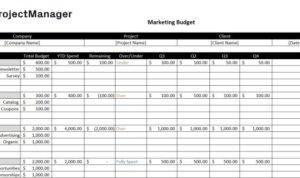Building a Sales Team is crucial for any business looking to boost revenue and expand its market reach. From identifying top talent to fostering a culture of collaboration, this guide dives deep into the essentials of creating a powerhouse sales team.
Whether you’re a seasoned sales manager or a budding entrepreneur, these insights will equip you with the knowledge and tools needed to build a winning sales team from the ground up.
Building a Sales Team
Building a strong sales team is crucial for the success of any business. A well-equipped sales team can drive revenue, build lasting customer relationships, and ultimately contribute to the growth of the company.
Key Qualities for Hiring Sales Team Members
When hiring sales team members, it is important to look for individuals who possess certain key qualities:
- Excellent communication skills
- Strong work ethic and motivation
- Ability to handle rejection and stay resilient
- Good listening skills and empathy
- Adaptability and willingness to learn
Initial Steps for Setting Up a Sales Team
Setting up a sales team involves several key steps to ensure a smooth and effective operation:
- Define clear roles and responsibilities for each team member
- Establish sales goals and targets
- Provide necessary training and resources
- Implement a CRM system for tracking leads and customer interactions
Strategies for Fostering Teamwork and Collaboration
Creating a culture of teamwork and collaboration within the sales team is essential for maximizing productivity and achieving common goals:
- Encourage open communication and feedback
- Organize team-building activities and events
- Recognize and reward individual and team achievements
- Promote a supportive and inclusive work environment
Recruiting Sales Team Members: Building A Sales Team

When building a successful sales team, finding the right candidates is crucial. Here are some key strategies for recruiting sales team members:
Identifying Sources for Recruiting Sales Team Members
- Utilize online job boards and social media platforms to reach a wide audience of potential candidates.
- Consider partnering with recruiting agencies or headhunters who specialize in sales roles.
- Tap into your professional network for referrals and recommendations from trusted contacts.
- Attend industry events and job fairs to connect with sales professionals who are actively seeking new opportunities.
Interview Process for Selecting the Right Candidates, Building a Sales Team
- Start with a phone screening to assess basic qualifications and interest in the role.
- Conduct in-person interviews to evaluate communication skills, sales experience, and cultural fit with the team.
- Use behavioral interview questions to gauge problem-solving abilities and past sales performance.
- Involve key stakeholders in the interview process to gather different perspectives on each candidate.
Role of Assessments and Tests in the Recruitment Process
- Administer sales aptitude tests to evaluate candidates’ natural sales abilities and potential for success in the role.
- Use personality assessments to assess traits like resilience, competitiveness, and communication style that are important for sales roles.
- Consider role-playing exercises to simulate sales scenarios and observe how candidates handle objections and close deals.
Tips for Onboarding New Sales Team Members Effectively
- Provide comprehensive training on products/services, sales techniques, and company culture to set new hires up for success.
- Assign mentors or buddy systems to help new team members acclimate to the team and learn the ropes quickly.
- Set clear goals and expectations for performance to keep new hires motivated and focused on achieving results.
- Regularly check in with new team members to provide feedback, support, and guidance as they ramp up in their roles.
Training and Development

Training and development are crucial aspects of building a successful sales team. Ongoing training ensures that team members are equipped with the necessary skills and knowledge to excel in their roles, adapt to changing market conditions, and meet customer needs effectively.
Importance of Ongoing Training
- Keeps sales team members updated on industry trends and best practices
- Improves product knowledge and sales techniques
- Enhances communication and negotiation skills
- Boosts confidence and motivation among team members
Different Training Methods and Tools
- Classroom training sessions
- On-the-job training through shadowing experienced sales reps
- Role-playing exercises to practice sales scenarios
- Online courses and webinars for remote learning
- Sales training software for tracking progress and providing feedback
Examples of Successful Sales Training Programs
- HubSpot Sales Academy: Offers free online courses on inbound sales techniques
- Xerox Sales Training Program: Focuses on consultative selling skills for complex solutions
- Sandler Training: Provides a comprehensive sales methodology for improving sales performance
Assessing the Effectiveness of Sales Training Initiatives
- Measure sales team performance before and after training
- Solicit feedback from sales team members on the usefulness of training sessions
- Analyze sales metrics such as conversion rates and revenue growth post-training
- Conduct surveys with customers to gauge the impact of improved sales techniques
Motivation and Incentives
When it comes to building a successful sales team, motivation plays a crucial role in driving performance. A motivated sales team is more likely to achieve targets and goals, leading to increased productivity and revenue for the company.
Setting Clear Sales Targets and Goals
Setting clear and achievable sales targets and goals is essential for keeping the sales team motivated and focused. When team members have a clear understanding of what is expected of them, they are more likely to work towards meeting and exceeding those goals. This clarity helps to create a sense of purpose and direction within the team.
- Establish specific sales targets for each team member based on their strengths and capabilities.
- Break down larger goals into smaller, achievable targets to provide a sense of progress and accomplishment.
- Regularly review and adjust sales targets as needed to ensure they remain challenging yet attainable.
Effective Sales Team Incentives and Rewards
Incentives and rewards can be powerful tools for motivating sales team members and driving performance. By offering attractive incentives and rewards, companies can encourage their sales team to go above and beyond in achieving their targets.
- Commission-based incentives tied to sales performance can motivate team members to close deals and increase revenue.
- Recognition programs that publicly acknowledge and reward top performers can boost morale and motivation within the team.
- Non-monetary incentives such as extra paid time off, gift cards, or company-sponsored outings can provide additional motivation and show appreciation for hard work.
Maintaining Motivation and Morale
Keeping motivation and morale high within the sales team is an ongoing process that requires consistent effort and attention. By implementing strategies to maintain motivation, companies can create a positive and productive work environment for their sales team.
- Regularly communicate with team members to provide feedback, support, and encouragement.
- Offer opportunities for professional development and training to help team members improve their skills and stay engaged.
- Create a positive and inclusive company culture that values teamwork, collaboration, and individual contributions.





